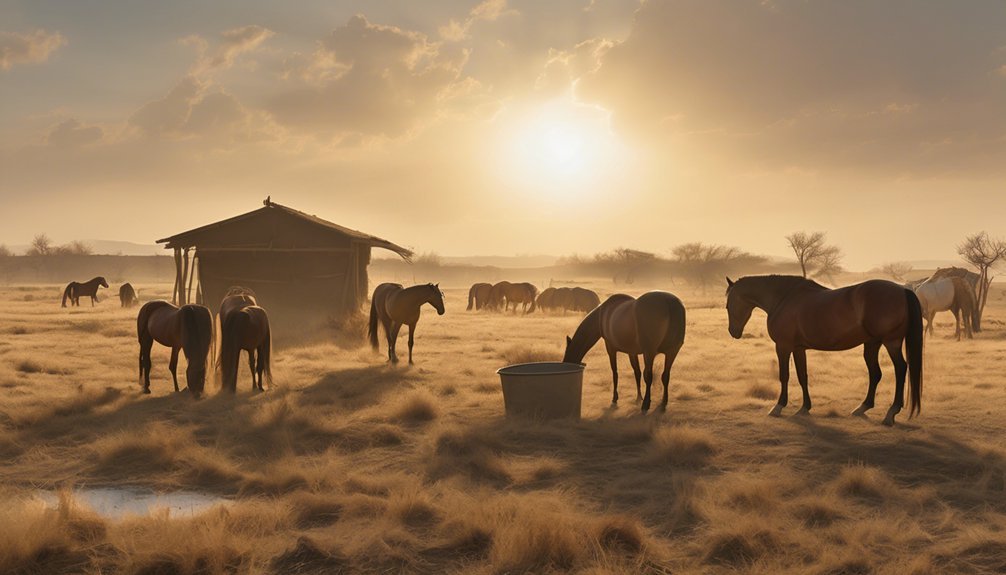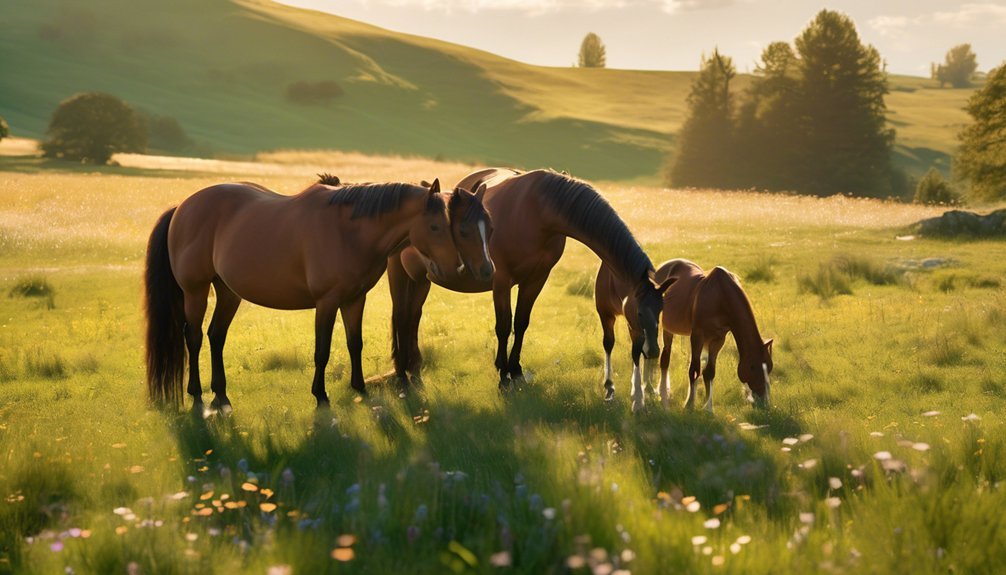
When it comes to feeding horses in heavy training, understanding their unique nutritional needs is crucial. You can't just rely on standard feeding practices; their diet must support increased energy demands and muscle recovery. From energy sources to protein requirements, each component plays a vital role in their performance. But how do you balance all these factors effectively? Let's explore the key elements that ensure your horse stays at the top of their game.
Key Takeaways
- Provide high-quality forage like fresh, leafy hay or pasture to ensure optimal digestibility and nutrient absorption.
- Balance energy sources by incorporating carbohydrates for quick energy and fats for sustained endurance during training.
- Include high-quality protein sources such as alfalfa and soybean meal to meet protein requirements for muscle repair and growth.
- Ensure proper vitamin and mineral intake, focusing on Vitamin E, calcium, phosphorus, and B Vitamins to support overall health and performance.
- Maintain hydration by providing access to clean water and offering electrolyte solutions after intense workouts to replenish lost minerals.
Understanding the Nutritional Needs of Heavy Training Horses

When you're managing a horse in heavy training, it's crucial to understand their unique nutritional needs to optimize performance and recovery. Horses in intense physical activity require a tailored diet that aligns with their dietary preferences and promotes overall health.
High-quality forage plays a vital role in meeting these needs. The forage quality impacts digestibility and nutrient absorption, directly influencing energy levels and stamina. You should prioritize fresh, leafy hay or pasture, ensuring it's free from mold and contaminants.
Additionally, consider incorporating supplements if your horse's dietary preferences lean toward specific nutrient deficiencies. By focusing on these elements, you can create a balanced nutrition plan that supports your horse's rigorous training regimen and enhances their vitality.
The Importance of Energy Sources
Understanding the importance of energy sources is vital for maintaining a horse's performance and overall health, especially during heavy training. Carbohydrate sources and fat benefits play a crucial role in fueling your horse's energy needs. Carbohydrates provide quick energy, while fats offer a concentrated energy source that supports endurance.
Here's a quick comparison of energy sources:
| Energy Source | Type | Benefits |
|---|---|---|
| Carbohydrates | Quick energy | Fast digestion |
| Fats | Slow-releasing | Sustained energy |
| Fiber | Digestive health | Supports gut function |
| Protein | Muscle repair | Not a primary energy source |
Incorporating the right balance of these energy sources will enhance your horse's training and overall vitality.
Protein Requirements for Muscle Development

Protein plays a crucial role in muscle development, as it provides the essential amino acids necessary for growth and repair. For horses in heavy training, understanding their protein requirements is vital for optimal performance.
You should focus on high-quality protein sources, such as alfalfa, soybean meal, and commercial feeds designed for active horses. These sources not only support muscle growth but also enhance muscle recovery after intense workouts.
Aim for a protein intake of around 10-14% of their total diet, adjusting according to the horse's specific needs and training intensity. By prioritizing these protein sources in your horse's diet, you'll help ensure they build and maintain strong muscles, ultimately improving their performance and overall well-being.
Essential Vitamins and Minerals
Though you may focus on macronutrients like protein, essential vitamins and minerals are equally critical for your horse's overall health and performance.
Proper vitamin absorption and maintaining a mineral balance can significantly impact your horse's energy levels, immunity, and recovery.
- Vitamin E: Supports muscle function and reduces oxidative stress.
- Calcium and Phosphorus: Essential for bone health and muscle contractions.
- B Vitamins: Aid in energy metabolism and nerve function.
Balancing these nutrients ensures your horse can perform at their best.
Many factors, such as diet and training intensity, can affect how well these vitamins and minerals are absorbed.
Regularly assess your horse's diet to ensure they're receiving the right amounts for optimal health and performance.
Hydration: The Key to Performance

While many horse owners prioritize nutrition, hydration often gets overlooked, yet it plays a crucial role in your horse's performance and overall well-being.
Maintaining optimal hydration is essential for muscle function, recovery, and stamina during heavy training. Ensure your horse has access to clean, fresh water at all times, as this is the primary hydration source.
Additionally, consider offering electrolyte solutions, especially after intense workouts, to replenish lost minerals. Timing is vital; encourage drinking before, during, and after exercise to prevent dehydration.
Monitor your horse's water intake and adjust as needed, especially in hot weather or during high-intensity training.
Feeding Frequency and Portion Control
Understanding the right feeding frequency and portion control is vital for your horse's health and performance. Proper meal timing ensures your horse receives the energy needed for heavy training, while appropriate portion sizes help maintain optimal body condition.
- Aim for multiple small meals throughout the day to support digestion.
- Adjust portion sizes based on your horse's workload, age, and metabolism.
- Monitor your horse's response to feeding to fine-tune their diet.
Common Feeding Mistakes to Avoid

Maintaining proper feeding frequency and portion control can significantly impact your horse's well-being, but it's equally important to avoid common feeding mistakes that can undermine these efforts.
One common misconception is that all horses require the same diet; in reality, each horse's needs vary based on age, weight, and training intensity. Overfeeding can lead to obesity and metabolic issues, while underfeeding may result in poor performance and health problems.
Additionally, ignoring the importance of hydration can disrupt your horse's digestion and overall health. Pay attention to your horse's feeding habits and adjust as necessary, ensuring you're not falling into these traps.
Supplements: When and Why to Use Them
Supplements can play a crucial role in enhancing your horse's diet, especially when specific nutritional gaps arise due to age, workload, or health issues.
Understanding the various supplement types available can help you optimize your horse's performance benefits.
Consider these key supplement types:
- Electrolytes: Essential for hydration and recovery after intense workouts.
- Joint support: Glucosamine or chondroitin can promote joint health, especially in older or heavily trained horses.
- Vitamins and minerals: Targeted additions can address deficiencies that may affect energy levels and overall health.
Using the right supplements at the right time can make a significant difference in your horse's training outcomes and overall well-being, ensuring they perform at their best.
Monitoring Your Horse's Condition and Adjusting Diet

Monitoring your horse's condition is vital for ensuring their diet meets their evolving needs. Regular condition assessments help you gauge their body score, muscle tone, and overall health.
Pay close attention to changes, especially during heavy training periods. If your horse starts losing weight or appears fatigued, it's time for diet adjustments. Increasing caloric intake or incorporating high-quality protein sources can provide the extra energy they need.
Conversely, if they're gaining too much weight, consider reducing grain or altering forage types. Keep a journal to track their progress, noting any changes in behavior or performance.
Frequently Asked Questions
Can I Feed My Horse Treats During Heavy Training?
Yes, you can feed your horse treats during training. Opt for healthy treat types like carrots or apples, using them as training rewards to motivate and strengthen your bond while ensuring they don't disrupt nutrition balance.
How Do I Choose the Right Feed Brand?
To choose the right feed brand, evaluate feed quality and brand reputation. Research ingredients, check reviews, and consult experts. You want a brand that prioritizes your horse's health and performance needs while ensuring consistent quality.
Should I Change My Horse's Diet Seasonally?
As leaves change colors and temperatures shift, consider seasonal adjustments for your horse's diet. Dietary changes can optimize energy levels, ensuring your horse thrives throughout the year, adapting to varying demands and maintaining peak health.
Is It Okay to Mix Different Feed Types?
Mixing different feed types can be okay if you ensure feed compatibility and maintain nutritional balance. It's crucial to monitor your horse's response and adjust as needed for optimal health and performance.
What Are Signs of Nutritional Deficiencies in My Horse?
If you notice weight loss, dull coat, lethargy, or behavioral changes, your horse might be facing dietary imbalances affecting nutrient absorption. Regularly assess their health, and consult a veterinarian to ensure proper nutrition and well-being.
Conclusion
In conclusion, while you might be tempted to think your horse can thrive on a diet of carrots and the occasional sugar cube, remember that a well-balanced diet is crucial for peak performance. After all, your equine athlete deserves more than just a snack bar's worth of nutrients. So, let's ditch the "just feed it hay" mentality and ensure your horse gets the fuel it needs—because a well-fed horse is a happy horse, and a happy horse doesn't throw you off!





